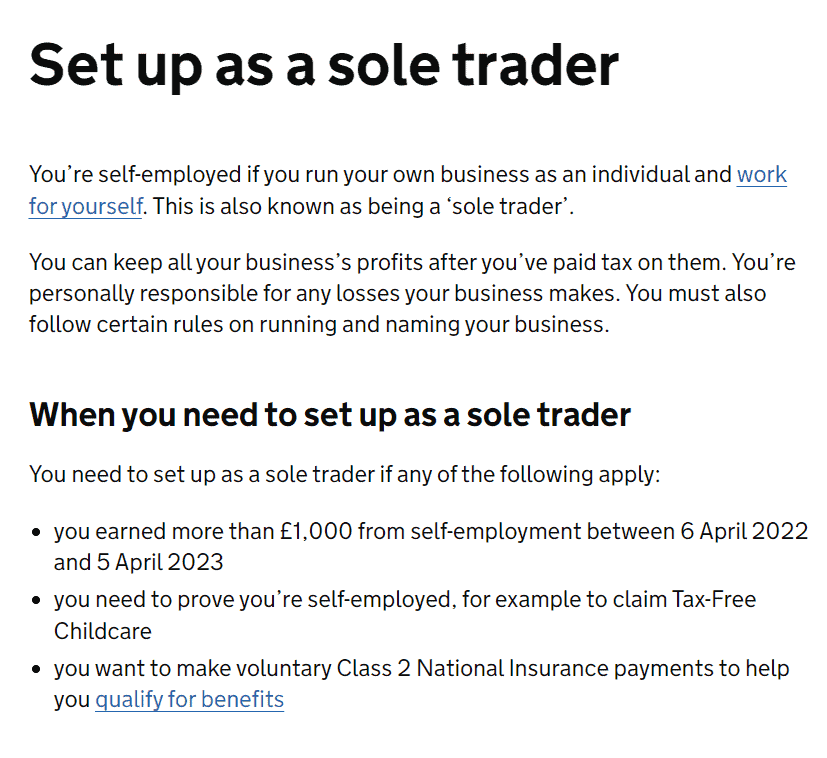Are you a sole trader and wondering how much tax you need to pay? The you’ll want to read the guide below:
What is Sole Trader Tax?
As a sole trader, you operate independently without an employer and don’t receive a fixed salary. Instead, the earnings generated by your business become your income. This means that taxes aren’t automatically deducted from your earnings, so it’s up to you to register and pay tax on what you make.
To ensure you can fulfil your tax obligations as a sole trader, the first step is to register with HM Revenue & Customs (HMRC). Understanding when and how to register is crucial. Let’s break it down.
If you began your self-employed work in May 2022, your business’s second tax year will commence on October 5, 2023. It’s vital to register with HMRC as a sole trader by this deadline to avoid any penalties. Keep in mind that each tax year spans from April 6 to April 5 of the following year.
To register as a sole trader and fulfil your tax obligations, you’ll need to notify HMRC that you will be paying taxes through Self Assessment and submit an annual tax return. Registering for self-assessment is a straightforward process that can be done online or by mail through the UK government website.

What Tax Does a Sole Trader Pay?
The amount of tax you pay as a sole trader depends on your profits and income during the financial year, which runs from April 6 to the following April 5.
The types of sole trader tax and rates you can expect are:
Income Tax
As a sole trader, you need to pay income tax on your personal income. This includes your business profits, rental income, investment gains, employment income, and dividends.
Every UK resident has a personal tax-free allowance (which is currently £12,570 for the 2023/24 tax year). This needs to be subtracted from the total income to determine the taxable income.
After deducting legitimate business expenses, you need to calculate your total income and file a tax return by January 31st of each year, paying the corresponding tax amount.
Once your income exceeds the tax-free personal allowance threshold, you’ll become liable for tax.
These are the income tax bands and rates for England, Wales, and Northern Ireland:
- Basic rate: £12,571 – £50,270 (Tax rate: 20%)
- Higher rate: £50,271 – £125,140 (Tax rate: 40%)
- Additional rate: £125,140 and above (Tax rate: 45%)
For sole traders living in Scotland, the tax band and rates are slightly different. You can find out more on the official government website.
Payments on Account (POA)
In most cases, sole traders are required to make advance Payments on Account for the following tax year. These payments are based on the assumption that your income or profit will be similar to the current year.
The POA is split into two equal instalments, with the first due on the 31st of January and the second by the 31st of July.
National Insurance Contributions (NICs)
Sole traders need to make NICs to fund public services and access benefits. There are two types of NICs to consider as a sole trader with profits over £12,570 or more a year:
- Class 2 – £3.45 a week
- Class 4 – 9% on profits between £12,570 and £50,270
2% on profits over £50,270
VAT
Lastly, sole traders must register for VAT if their annual turnover exceeds £85,000 within a 12-month period (or is expected to within 30 days). If your annual turnover is below this, you can still voluntarily register.
Being VAT registered as a sole trader means you need to send a self-assessment tax return every year to HMRC.
A great way for sole traders to ensure they pay tax and avoid costly VAT mistakes is to have a separate business bank account, although you don’t strictly speaking need one.
Conclusion
As a sole trader, your tax liability is based on your self-employment income, minus any allowable expenses and deductions. By knowing the tax rates and thresholds applicable to your income, you can effectively plan and budget for your tax obligations.
Being self-employed often means juggling multiple tasks at once. That’s why we recommend hiring a dedicated sole trader accountant to help you stay on top of your tax bill and keep tabs on the health of your finances.
Sources:
https://startups.co.uk/tax/self-employed-sole-trader-tax/
https://www.gov.uk/set-up-sole-trader
https://www.gov.uk/self-employed-national-insurance-rates
https://www.accountsandlegal.co.uk/tax-advice/a-guide-to-tax-rates-for-sole-traders
https://www.mazumamoney.co.uk/news/how-much-tax-does-a-sole-trader-pay-and-how/